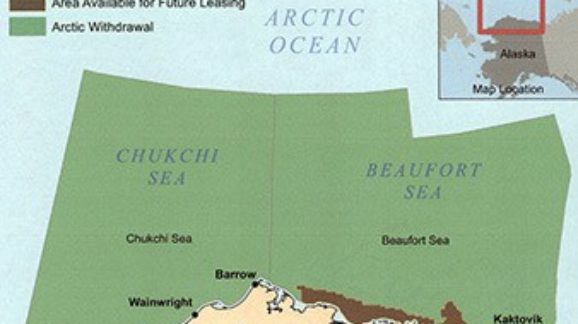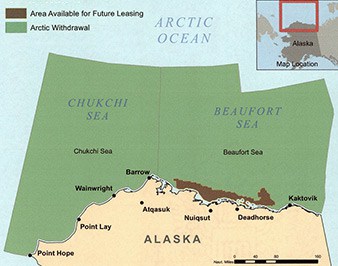Can Trump (or Congress) Rescind Obama’s Arctic Drilling Ban?

Talk about midnight regulations. President Obama yesterday designated “the vast majority of U.S. waters in the Chukchi and Beaufort Seas as indefinitely off limits to offshore oil and gas leasing.” He also prohibited oil and gas operations in 26 underwater canyons in the Atlantic Ocean. In all, he “protected” (locked up) more than 125 million acres “for a time period without specific expiration.”

Green groups were jubilant. Reports the Washington Post:
League of Conservation Voters President Gene Karpinski called it “an incredible holiday gift,” saying that “an oil spill in these pristine waters would be devastating to the wildlife and people who live in the region.” Rhea Suh, president of the Natural Resources Defense Council, called it “a historic victory in our fight to save our Arctic and Atlantic waters, marine life, coastal communities and all they support.” Carter Roberts, president and chief executive of the World Wildlife Fund, applauded what he called “a bold decision” that “signals some places are just too important not to protect.”
In sharp contrast, House Natural Resources Chairman Rob Bishop (R-Utah) blasted the decision as “nothing more than ideological chest-thumping from the president for the far left.” American Petroleum Institute spokesperson Erik Milito said the administration’s action “ignores congressional intent, our national security, and vital, good-paying job opportunities for our shipyards, unions, and businesses of all types across the country.” Skeptical blogger Eric Worrall called the policy “a graceless act of contempt for the will of the American people.” How so? “Opening public land to oil and gas was a central promise of President-elect Trump’s campaign manifesto,” and “Trump won the electoral college, by a wide margin.”
Can a drilling ban imposed by the stroke a presidential pen be revoked just as easily? Obama officials told E&E News that the controlling legal authority, Section 12(a) of the 1953 Outer Continental Shelf Lands Act (OCSLA), is a one way street. Whereas the provision expressly authorizes the president to “withdraw from disposition any of the unleased lands of the Outer Continental Shelf,” it contains no explicit authority to reverse withdrawals once made.
Such reasoning is uncharacteristic of Obama officials and “progressives” generally, who never let the absence of explicit statutory authority stand in the way of their climate agenda. Besides, their claim makes no sense. Why would Congress authorize the president to withdraw OCS lands based on his assessment of the national interest yet not allow him to cancel or modify the withdrawal in light of new circumstances or information bearing on the national interest?
Their argument is also conflicted. Section 12(a) does not explicitly state that one president may permanently tie the hands of all future presidents in regard to the disposition of OCS lands. Indeed, any such from-now-until-doomsday clause would be patently ridiculous. So, once we make explicit the meaning the Obama officials impute to Section 12(a), we see that it cannot mean what they claim it means.
The same officials also told E&E news that “No president has ever acted to reverse an indefinite withdrawal, and we believe there is a strong legal basis that these withdrawals … will go forward and stand the test of time.” That is incorrect. On July 14, 2008, President George W. Bush issued an executive memorandum rescinding most of the OCS drilling restrictions adopted by President George H.W. Bush on June 26, 1990 and reaffirmed by President Bill Clinton on June 12, 1998. As the Congressional Research Service explains:
On July 14, 2008, President George W. Bush issued an executive memorandum that rescinded the executive moratorium on offshore drilling created by the 1990 order of President George H. W. Bush and renewed by President Bill Clinton in 1998. The memorandum revised the language of the previous memorandum so that only areas designated as marine sanctuaries are withdrawn from disposition. The withdrawal has no expiration date.
If Dubya could do it, so can The Donald.
Besides, the Congressional Review Act provides an expedited procedure for repealing Obama’s holiday gift to the environmental movement and eye-poke to the electorate.
Under the CRA, Congress has 60 legislative days to pass a joint resolution of disapproval of a final agency rule. To pass in the Senate, the resolution needs only a simple majority, not the 60 votes required for cloture, and Senate debate is limited to a maximum of 10 hours. If both chambers pass the resolution and the president signs it, the targeted rule is overturned.
Obama officials might argue as follows: the CRA applies to final agency rules, the President is not an agency, and the OCS drilling ban is not a rule. Wrong on all counts.
The CRA defines “rule” as the “whole or part of an agency statement of general or particular applicability and future effect designed to implement, interpret, or prescribe law or policy.” Obama’s memorandum is clearly a statement of general applicability and future effect designed to implement, interpret, and prescribe policy with respect to oil and gas operations on OCS lands.
The CRA defines “agency” as “each authority of the Government of the United States, whether or not it is within or subject to review by another agency.” The President is obviously an authority of the U.S. Government.
The CRA applies. Which means Obama’s Arctic lockup is toast.